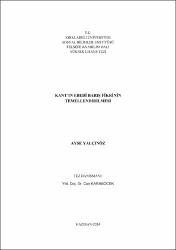| dc.contributor.author | Yalçınöz, Ayşe | |
| dc.date | 2014-11-27 | |
| dc.date.accessioned | 2014-11-27T10:04:51Z | |
| dc.date.available | 2014-11-27T10:04:51Z | |
| dc.date.issued | 2014 | |
| dc.identifier.uri | https://hdl.handle.net/20.500.11857/284 | |
| dc.description.abstract | Aydınlanma düşüncesinin en önemli filozoflarından olan Kant, akla büyük önem vermiştir. Akla olan güveniyle Ebedi Barış’ın gerçekleşebileceğine inanmıştır. Bu düşüncesinin gerçekleşebilmesi için ahlaki ve tarihi ilerlemeyi savunmuştur. Zaten doğanın da bu yönde bireyi desteklediğini belirtmiştir. Devletlerinde ahlaki birer varlık olmalarından dolayı bu idealin bir süreç içerisinde olacağını varsaymıştır. Uluslar arası ilişkiler düşüncesinde, devlette olduğu gibi ahlaki bir ilke olarak bireyi de siyasetin temel tamamlayıcı ilkelerinden görmüştür. Bu nedenle kozmopolitan bir yaklaşım benimsemiştir. Özellikle cumhuriyetçi yönetimlerin artmasıyla bu devletlerden oluşacak federasyon düşüncesini savunmuştur. Bu federasyon anlayışının Ebedi Barış için önemini ifade etmiştir. Bu çalışmada, geçen zaman içinde filozofun öne sürmüş olduğu bazı düşüncelerinin gerçekleşen yönleri ortaya konmuştur. Fakat dünya çapında barış ortamının tesis edilebileceğini ümit etmenin oldukça iyimser bir düşünde olduğu ifade edilmiştir. Dünyanın topyekûn olarak Ebedi Barış ideali üzerinde birleşmesi düşüncesinin günümüz şartları açısından uzak bir ihtimal olduğu belirtilmiştir. | |
| dc.description.abstract | As one of the most important philosophers of Enlightenment Kant, had given great importance to reason. With the confidence to reason he had believed that the Perpetual Peace could happen. He had defended the ethic and historical progress in order this to happen. He had stated that the nature, in fact, supported individuals in this direction. He had assumed that this ideal would have come true in process due to states as being ethical entities. In the idea of international relations, individuals had been seen as a primary complimentary principle of politics as a moral principle similarly to states. Therefore he had accepted a cosmopolitan approach. By considering the increase of the republican governments Kant had defended the idea of federations constituted of such countries. He had refered to the importance of federation for Perpetual Peace. This study is to show the aspects of the ideas of the philosopher that have been actualized in time. However, it also expresses that hoping to build peace globally would be a quite optimistic idea. It justifies that the world united on Perpetual Peace entirely would be a remote possibility under the present day conditions. | |
| dc.language.iso | tur | |
| dc.rights | info:eu-repo/semantics/openAccess | |
| dc.rights | Attribution-NonCommercial-NoDerivs 3.0 United States | * |
| dc.rights.uri | http://creativecommons.org/licenses/by-nc-nd/3.0/us/ | * |
| dc.subject | Aydınlanma | |
| dc.subject | Ebedi Barış | |
| dc.subject | Cumhuriyet | |
| dc.subject | Ahlak | |
| dc.subject | Federasyon | |
| dc.subject | Enlightenment | |
| dc.subject | Perpetual Piece | |
| dc.subject | Republic | |
| dc.subject | Ethic | |
| dc.subject | Federation | |
| dc.title | Kant’ın Ebedi Barış Fikrinin Temellendirilmesi | |
| dc.title.alternative | Kant’s Justification of The Idea Perpetual Peace | |
| dc.type | masterThesis | |
| dc.department | [KLÜ] | |
| dc.relation.publicationcategory | Tez | |





















